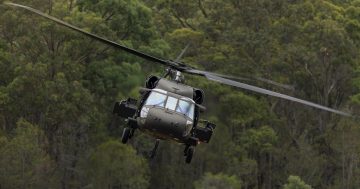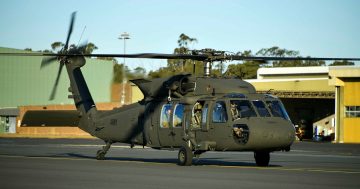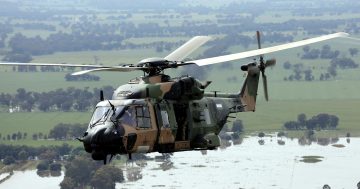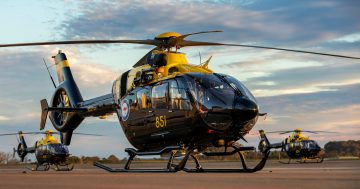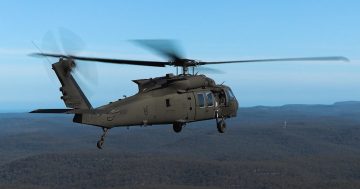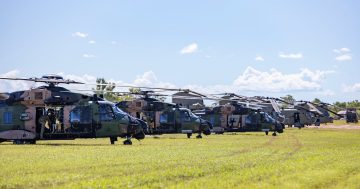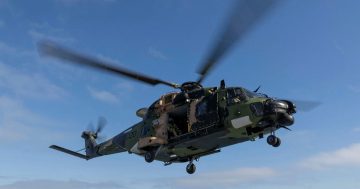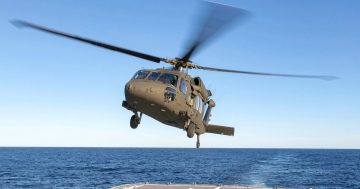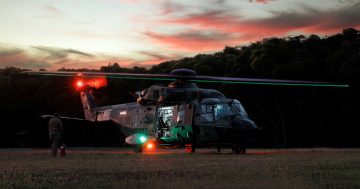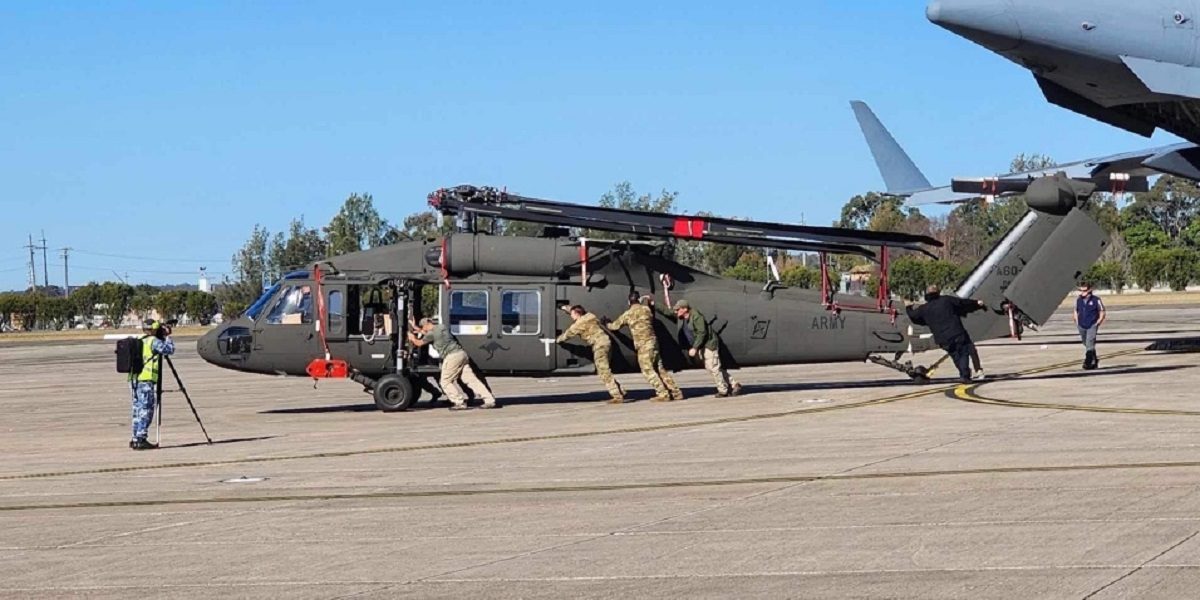
The first of 40 new Sikorsky UH-60M Black Hawk helicopters is unloaded from a US Air Force C-17 transport at RAAF Base Richmond on 30 July. Photo: Courtesy of the Country Caller.
The first two of 40 new Sikorsky UH-60M Black Hawk helicopters for the Australian Army were quietly delivered to Australia on 30 July, as investigations into the fatal crash of an MRH-90 Taipan on 28 July continue.
The aircraft were delivered to RAAF Base Richmond in Sydney in a US Air Force C-17 transport and, after being re-assembled, were flown to Holsworthy Army Barracks south of Sydney, the home base of the Army’s No 6 Aviation Regiment (6Avn), which is tasked with the support of special forces and in the counter-terrorism role.
6Avn is also the operating unit of the MRH-90 that crashed in the Whitsundays region, resulting in the loss of four aircrew. The aircraft was operating at night with another MRH-90 and two other helicopters from the US and New Zealand when it impacted the water.
Early reports and commentary that the helicopter had ditched – which suggests an intentional water landing under some level of control – have proven inaccurate, and it has since been revealed that the helicopter hit the water at high speed. The rear cabin and part of the tail boom were recovered a couple of days after the accident, and the forward cabin was discovered by a remote-controlled underwater vehicle from HMAS Huon on 2 August.
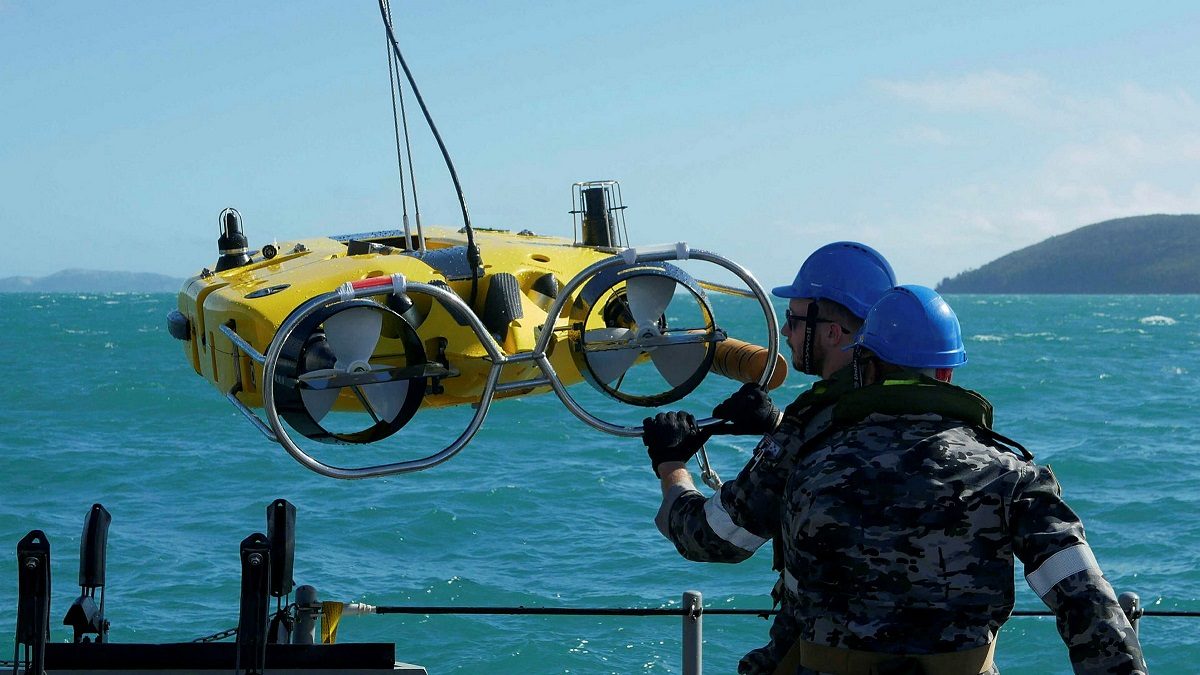
A remote-controlled underwater vehicle from HMAS Huon during the search for the MRH 90. Photo: ADF.
The wreckage is said to be in 40 metres of water and will require delicate handling to avoid further damage during its recovery. The recovery effort is being coordinated by ADV Reliant, a converted commercial vessel which was acquired in 2022 and features a crane, spacious deck and remote-controlled underwater vehicle handling equipment.
Despite the arrival of the two new Black Hawks, these aircraft won’t be available for operational service any time soon. More helicopters will be delivered over the next two years, there will be a training program for aircrew and support staff, the build-up and demonstration of a sustainment capability, and a comprehensive test and evaluation phase before the army can declare an initial operational capability. This is unlikely to be before the back end of 2024 at the earliest.
In the meantime, with the MRH-90 feet grounded and unlikely to fly again during the initial crash investigation, the army is left with a huge capability gap in its ability to move its soldiers by air.
Ironically, the MRH-90 replaced Australia’s first series of S-70A-9 Black Hawks, which had entered service in the 1980s. Although externally similar to the new UH-60M version, these early Black Hawks were far less sophisticated in terms of avionics, sensors, communications, self-protection systems and some structural elements.
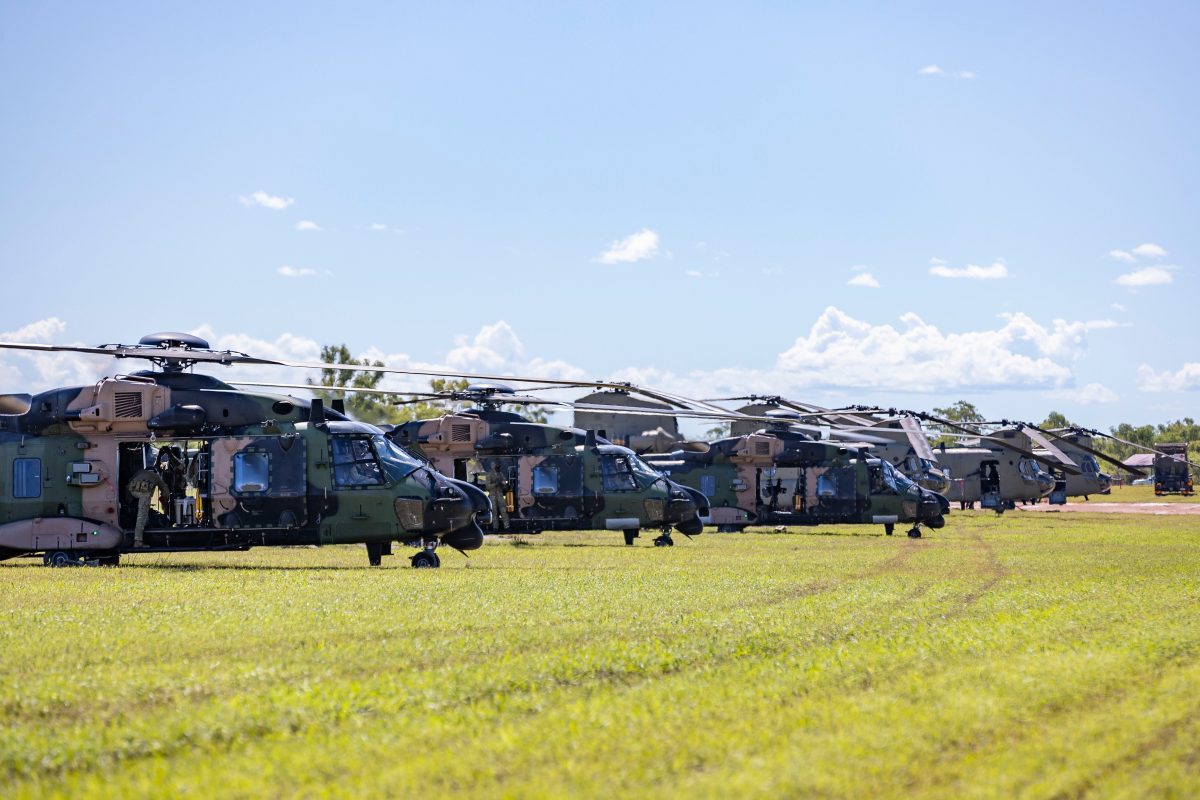
The grounding of the army’s MRH 90 fleet leaves a large capability gap while Army waits for the new Black Hawks to enter service. Photo: ADF.
The early withdrawal of the Taipan was first announced in December 2021 when, at the retirement ceremony for the last of Army’s original Black Hawks in Sydney, then Defence Minister Peter Dutton announced a new batch of Black Hawks would be acquired and the MRH-90 would be retired 13 years ahead of its planned 2037 withdrawal.
“The performance of the MRH90 Taipan has been an ongoing and well-documented concern for Defence and there has been a significant effort at great expense to try to remediate those issues,” Mr Dutton said in a release on 10 December 2021. “It is critically important there is a safe, reliable and capable utility helicopter available for our service men and women into the future, with reasonable and predictable operating costs.”
On 27 June 2022, the US Army and Sikorsky signed a multi-year contract for the supply of between 120 and 255 UH-60M Black Hawks for the US and unspecified Foreign Military Sales customers.
Two months later on 25 August 2022, the US Defense Security Cooperation Agency (DSCA) notified Congress of US State Department’s approval of the sale of the Black Hawks to Australia.

One of the two new UH-60Ms in a hangar at RAAF Base Richmond prior to flying to Holsworthy Army Barracks. Photo: Courtesy of the Country Caller.
The DSCA notification said Australia had requested to buy the 40 aircraft, eight spare engines, 44 missile warning systems and other electronic warfare self-defence systems, and a comprehensive package of communications, navigation, and other advanced equipment.
The package also included training devices for aircrew, maintenance crews and avionics technicians. The total cost was expected to be US$1.95 billion (A$2.96 billion).
In January 2023 the government confirmed the new Black Hawk acquisition would go ahead under Project LAND 4507 Phase 1, and said delivery of the new aircraft would commence this year.
“The Black Hawk will support the deployment of our troops and their equipment where they are needed in times of crisis,” the Australian Army’s Head of Land Capability Major General Jeremy King said in an 18 January media release. “The Black Hawk is a reliable, proven and mature platform supported by a robust global supply chain.”
Original Article published by Andrew McLaughlin on Riotact.


